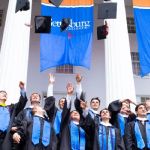

By all accounts, Cameron Stewart ’18 has thrived as an international student-athlete over his first two years with the Gettysburg College men’s basketball team.
Despite having never set foot on the East Coast of the U.S. prior to College orientation, the Sydney Australia native adapted well to Gettysburg. He learned a much different style of basketball (Australia uses a shorter shot clock and plays a much more physical game) and broke into the Bullets starting lineup right away. Last season, he captured MVP honors at the Gettysburg Tip-Off Tournament.
A health sciences major, Stewart has also learned to overcome challenges away from the court. He credits the tremendous support he has received from faculty.
“Having a tough major and taking a business minor has taken its toll on my body, but I know there are academic and support staff I seek when I need their assistance,” he said. “The school provides me the opportunities to succeed, and it is a great feeling, knowing there is a small army of people here to help.”
Stewart is among a growing number of international student-athletes at Gettysburg, reflecting an increasingly diverse student body.
In just the last three years, the number of international students at Gettysburg has more than doubled, from 2.5 percent of the overall enrollment in 2013–14 to 5.2 percent in 2015–16.
On Bullets teams, Stewart is joined by nine other international student-athletes, including his teammate Mateus Maccieri ’19, who grew up playing basketball in Italy. Others include Baki Bawa ’18 (Ghana), Sakyki Hylton-Dei ’18 (Switzerland), and Kingsley Nzekwe ’19, Ezekiel Omosanya ’20, and Precious Ozoh ’20 (all from Nigeria) of the men’s soccer team; Luca Menicali ’19 (Italy) of the men’s tennis squad; Diego Rodriguez ’19 (Mexico) of the men’s track and field team; and Inayah Sherry ’19 (Barbados) of the women’s swimming team.
Stewart is not the only one who needed to learn a new way to play his sport. Maccieri has also adapted to the American style of basketball and had significant playing time his first year.
Nzekwe grew up playing basketball in Nigeria before focusing on soccer at a private school in North Carolina. Although he also made heavy contributions as a first-year, he feels as if he is still in the learning mode.
“Coach [Mark] Mettrick has been working with me on playing soccer the way it’s meant to be played,” he said. “In Nigeria it was a lot more physical. So I’ve had to learn to use more brain than brawn.”
Although their experiences have been as varied as the nations they represent, a common thread for Gettysburg’s international student-athletes has been the support they have found on campus.
Bawa broke into the starting lineup immediately as a first-year. He suffered a season-ending knee injury that cost him his sophomore campaign, but is grateful for the help of the athletic training staff. “They’ve done a great job—they work with me almost every day,” said Bawa. “They give me the necessary support that I need. They encourage me and make me feel positive.”
Sherry also made her presence felt right from the start as one of the team’s top sprint freestylers. She swam the leadoff leg of the 200-yard freestyle relay that captured a silver medal at the Centennial Conference Championships, where she helped the Bullets capture runner-up status.
She has found there to be no shortage of support systems at the College, citing the Black Student Union, the Office of Multicultural Engagement, and the Dean’s Office, where she works.
“Some of the things that affect me on a daily basis don’t affect the rest of the team,” she said. “So just having people to talk to outside of that circle has really helped me.”
The international student-athletes value the camaraderie they experience as members of their teams.
“In other places I have lived, we would only practice about three to four times a week, and that would be the only times I would usually see my teammates, because most of us went to different schools,” said Hylton-Dei, who has also lived in Ghana and Italy. “So my favorite part about soccer [at Gettysburg] would definitely be the time spent with teammates. The everlasting bonds that you create are something really special. You essentially become part of a family where you can call one another brother.”
“It’s what I was looking for from the beginning,” said Menicali. “The way we encourage each other, I feel a lot more connected to the team than I did back home. I’ve been able to build some friendships and connections through tennis. It’s really fun to play for and represent the school—it’s something to be proud of.”
For Rodriguez, being involved in track and field was a tremendous help in his transition as an international student-athlete.
“You’re an outsider when you’re from another country,” said Rodriguez. “The first week or so I was here, it was kind of tough. But I had some friends on the track team that helped me. The more I went to practice, the more comfortable I felt.”
“I think they give players on the team and students at the College a different perspective,” said Mettrick, a native of England who was an international student-athlete, himself, at Hartwick College during the 1980s. “That can really broaden the experience of our players and our students on campus.”


